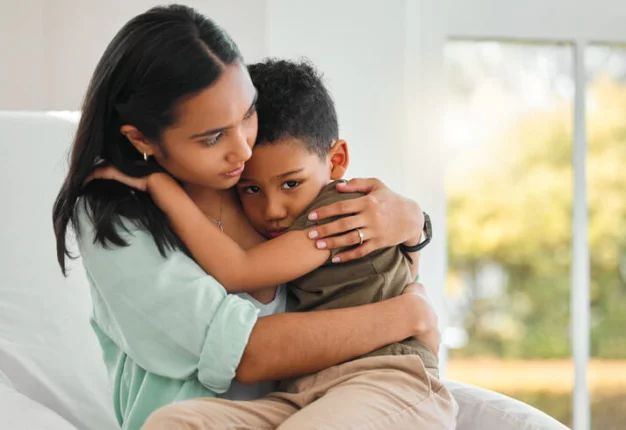Domestic Violence: Restricting Parental Responsibility

Contact
Table of Contents
Domestic violence, coercive control and restricting parental responsibility
Parental responsibility (PR) is an inherent legal right for most birth parents, but it is possible for a parent to lose those legal rights and responsibilities in serious cases of violence and abuse.
Any parent who is the victim or perpetrator of domestic violence or abuse is reminded that judges can severely restrict a parent’s PR. A recent decision [Re C (A Child) (No Contact) [2024] EWFC 366] helpfully considered the circumstances in which restricting parental responsibility were necessary and proportionate to protect those at risk.
At Osbornes Law, our expert family and children solicitors understand how emotive issues of PR and the safety and wellbeing of a child may become. Our specialist team are used to taking swift and robust action to support parents seeking to protect their children from harm.
Parental responsibility
Parental responsibility is defined as “all of the rights, duties, powers, responsibilities and authorities which by law a parent of a child has in relation to the child and his property” (section 3 Children Act 1989). Those rights etc range from making decisions around the child’s health and medical treatment, their living arrangements and education – to religious upbringing and social interactions.
So, who has PR? The birth mother automatically acquires PR. The father has PR if married to the mother when the child was born or (if unmarried) he is named as father on the birth certificate.
However, the courts can restrict or even remove a parent’s PR if exceptional cases justify it. Usually, PR would be restricted where a child is at serious risk of harm or neglect from a parent. The courts can do this through Prohibited Steps Orders and Specific Issue Orders under s8(1) Children Act.
What happened in this case?
These were private children proceedings involving an 8-year-old boy (C), heard against the background of violence, domestic abuse and coercion on the part of the father. He had served part of a 3½-year prison sentence for assaulting the mother, C and another child; and threatening to kill the mother. He had also admitted to controlling and coercive behaviour towards M over a 4-year period.
An indefinite restraining order prevented the father from any contact with either M or the children (unless organised and supervised by social services); but that didn’t stop him applying for contact with C before his release from prison on licence.
The mother, who told the court she had implemented extensive security measures at home, said the father had breached the restraining order and wanted the court to restrict his PR.
As with any decision to be made concerning a child, the child’s welfare is the Court’s paramount consideration. Also, there is a presumption that a parent’s involvement in a child’s life will further the child’s welfare unless it can be shown it puts the child at risk of harm.
After hearing evidence from both parties as well as expert evidence, the judge decided to remove the father’s parental responsibility. He found that C’s physical, emotional and educational needs were being met by M; and he was “settled and secure”.
However, C was also suffering severe anxiety and sleep difficulties directly as a result of being exposed to domestic abuse and the trauma from his father’s conduct. It was also clear on the evidence – and given C’s own wishes and feelings – that contact with his father was not in his best interests.
The judge ruled that C should live with M (who was “a good mother”) and he would have no contact, directly or indirectly, with the father.
Significantly, he also ordered that the father should not exercise PR in relation to C and imposed a specific issue order and prohibited steps orders to that effect. Whilst such orders are rare, the judge said this was a necessary and proportionate order in the circumstances.
The court also made a further order preventing the father from making any further applications under the Children Act (unless a judge gives permission) until C reaches 18.
A copy of the judge’s order setting out those restrictions would be disclosed to organisations such as C’s school and GP, the local authority and any other professionals working with C.
How we can help
Our specialist family and children lawyers can support you in matters involving parental responsibility and the protection of your child. For early advice, please contact us by:
- Filling in our online enquiry form; or
- Calling us on 020 7485 8811
Share this article
Contact us today
Call us 020 7485 8811
Email us Send us an email and we’ll get back to you
Maria takes a child-focused approach to cases. She is good at grasping how a child might feel in a situation and this makes her stand out as excellent in her field.
Jonathan is thorough, intelligent, hard-working and committed. He knows the law very well and is committed to the rights of children.
Bridget has a phenomenal reputation, is a very good lawyer and one of the stars in children work.
Osbornes offers a high level of client care and manages client expectations realistically.
They have a strong team, are heavyweights in this space and are very well respected in the courts.
Simone McGrath is an excellent international children lawyer.
I have found the team at Osbornes works very well together to diligently produce a quality end result. Client service has been excellent and I feel like I am in safe hands.
I consider them a go-to for conciliatory work on the children side.
Osbornes is a power house of a family firm. They are robust but realistic and client focused.
Osbornes has lawyers with excellent experience.
Bridget Thompson handles child inclusive mediations.
Lisa pepper heads the Mediation team and she is often mediating for high-net-worth individuals in both financial and private children matters.
Simone McGrath has an incredible knowledge of international cases. She has been involved in many leading cases and is a go-to lawyer in the field.
Maria Kitsiou heads up the domestic children offering.
Lauren Hall leads the international children team.
Osbornes‘ family team is headed up by Mark Freedman, a mediator and fighter who will get the job done on both complex financial matters and international children cases.
A market leader across public law, international cases, financial and children work.
The team is experienced in handling matters where there are allegations of abuse and non-accidental injury, as well as situations where children's welfare is at risk due to parents' substance misuse or mental health issues.
The lawyers at Osbornes are very well established and have a lot of experience between them, which gives them a lot of confidence and a willingness to think out of the box.
Their client care is really impressive and they have such breadth of experience
In a long standing issue with my ex and our child, Lisa and her team have always given me advice that has been first class. Lisa has a deep knowledge of how the courts work and which arguments will work and which will not and will advice exactly what to do and when.
My solicitor Jon Jonas came across as a genuine, very skilled solicitor who demonstrated great insights and experience in complex child arrangement cases. He has been able to create and implement an effective strategy to deal with extremely toxic matters.
Bridget Thompson is a public law specialist noted for her extensive children public law practice.
"David Leadercrammer is such an experienced wonderful lawyer who you would want on the other side of your case. He’s sensible, pragmatic and hugely experienced in money and children cases."
Simone McGrath – Exceptional knowledge of international children matters, particularly 1980 Hague Convention cases. Fights hard for her clients.
"Bridget Thompson combines her excellent legal knowledge with a clear, succinct and robust style of advice and advocacy. Her approach clearly inspires a high degree of client confidence in her"
"She is excellent. She's very reliable, talks about her cases passionately and is very committed to her clients."
"I consider the firm to be very experienced in child care cases and to provide a very professional and high standard of work"
Bridget Thompson is a public law specialist noted for her extensive practice in matters involving alternative families and adoption. An interviewee observes: "She's a fighter, she's clever, and she understands all aspects of a case."
"Well-regarded family practice assisting clients with substantial matrimonial disputes and sensitive children proceedings."
"Simone is absolutely on top of the game. She has great attention to detail, and has her clients' needs at heart."
"Bridget is client-focused, a pleasure to work with and incredibly supportive to her clients."
Bridget Thompson heads the family team, where client care is the top priority.
Simone McGrath is a highly knowledgeable practitioner with a focus on international child abduction matters. She has a large expertise in public and private law.
Simone McGrath handles international child abduction cases and challenging care proceedings relating to non-accidental injuries.
This team is perhaps best known for its children work, often involving complex international dynamics.
Naomi Angell leads the market in cross-border children law matters. Sources confirm that she is "at the cutting edge of changing law and policy" when it comes to international adoption
Related InsightsVIEW ALL
- 16.1.2025
The Importance Of An Older Child’s Feelings...
The importance of an older child’s feelings and wishes when making a final order When decisions are made concerning...
Read more - 17.12.2024
Domestic Abuse Allegations: Unsupervised Contact Controversy
Unsupervised Contact Was Premature When Domestic Abuse Alleged Unsupervised contact is not appropriate where a child is considered to be...
Read more - 16.12.2024
Vulnerable Clients: Female Psychologist Appointed
Court Allows Female Expert for Abuse Victim in Family Case Many of our family clients are highly vulnerable, and sensitivity...
Read more - 27.9.2024
Navigating Divorce, Child Arrangements, and the Jewish Festivals:...
A Jewish divorce presents unique challenges, especially regarding child arrangements and upcoming festivals. Balancing differing levels of religious observance can...
Read more - 5.8.2024
Why Did Lauryn Goodman Take Kyle Walker to...
Introduction to the case After a judge took the unusual step of making his judgement public, we’re starting to...
Read more - 11.7.2024
Unmarried With Children and Splitting Up
Unmarried with Children? What are your Financial Rights? Know Your Financial Rights Under Schedule One Children Act 1989 A claim under...
Read more - 17.6.2024
What is Early Neutral Evaluation?
Early Neutral Evaluation (ENE) is a form of Non-Court Dispute Resolution where the separated couple invites a neutral third party...
Read more - 4.6.2024
What is Parallel Parenting? Examples, rules, and why...
Parallel parenting is a practical solution for families experiencing ongoing conflict who find traditional co-parenting unworkable. In this article, we...
Read more - 3.6.2024
Co-Parenting with a Narcissist
Can you co-parent with a narcissist? Co-parenting with a narcissist ex can be daunting, but it’s possible with the...
Read more - 29.5.2024
Co-Parenting Agreements
Is co-parenting right for us? There is no single approach to parenting your children after a divorce or separation. How...
Read more - 15.5.2024
Can a Mother Stop a Father from Seeing...
Can my ex stop me from seeing my child? There is a common misconception that mothers have more rights than...
Read more - 14.12.2023
Parental alienation: A legal overview
Sometimes, a child may turn against one of their parents due to the other parent’s manipulation or influence. This...
Read more - 16.8.2023
Child Maintenance for High Earners
How much should be paid? When separating or divorcing parents cannot agree the amount of child maintenance to be paid, (...
Read more - 25.7.2023
Parental Conduct and Child Arrangements
The Role of Family Dynamics in Child Arrangement Cases In proceedings involving children, the parents should consider the impact their...
Read more - 22.3.2023
What is Parental Responsibility?
Understanding Parental Responsibility Parental responsibility is the legal term used to describe parents’ duties and responsibilities for their children. These...
Read more - 18.1.2022
6 cases that shape a private children dispute
Family disputes involving children can be particularly emotive, which is why our expert children lawyers work tirelessly to understand how...
Read more - 10.8.2021
Child Maintenance: When is capital, income?
Reading a recent case from the Child Maintenance Tribunal, I considered it worth flagging up that the Child Maintenance Rules...
Read more - 11.3.2021
Financial responsibilities of father on divorce
What are the financial responsibilities of a father for a child? The period drama Bridgerton, the runaway success of the...
Read more - 13.8.2019
Child Arrangements at Christmas
The Christmas period can be a hectic and stressful time for all parents, but for separated parents, it can be...
Read more - 4.4.2019
Parenting Plans
Do I need a parenting plan? A parenting plan can be highly beneficial for families that share parenting responsibilities. It...
Read more - 2.1.2018
How To Tell Children About Divorce
How to tell kids about divorce The rise in divorce globally has turned the attention of academics and researchers towards...
Read more - 19.6.2012
Children disagreements during Easter holidays
The Easter holidays can be a flashpoint for disagreements. When couples separate, it can be very difficult to reach an...
Read more
























